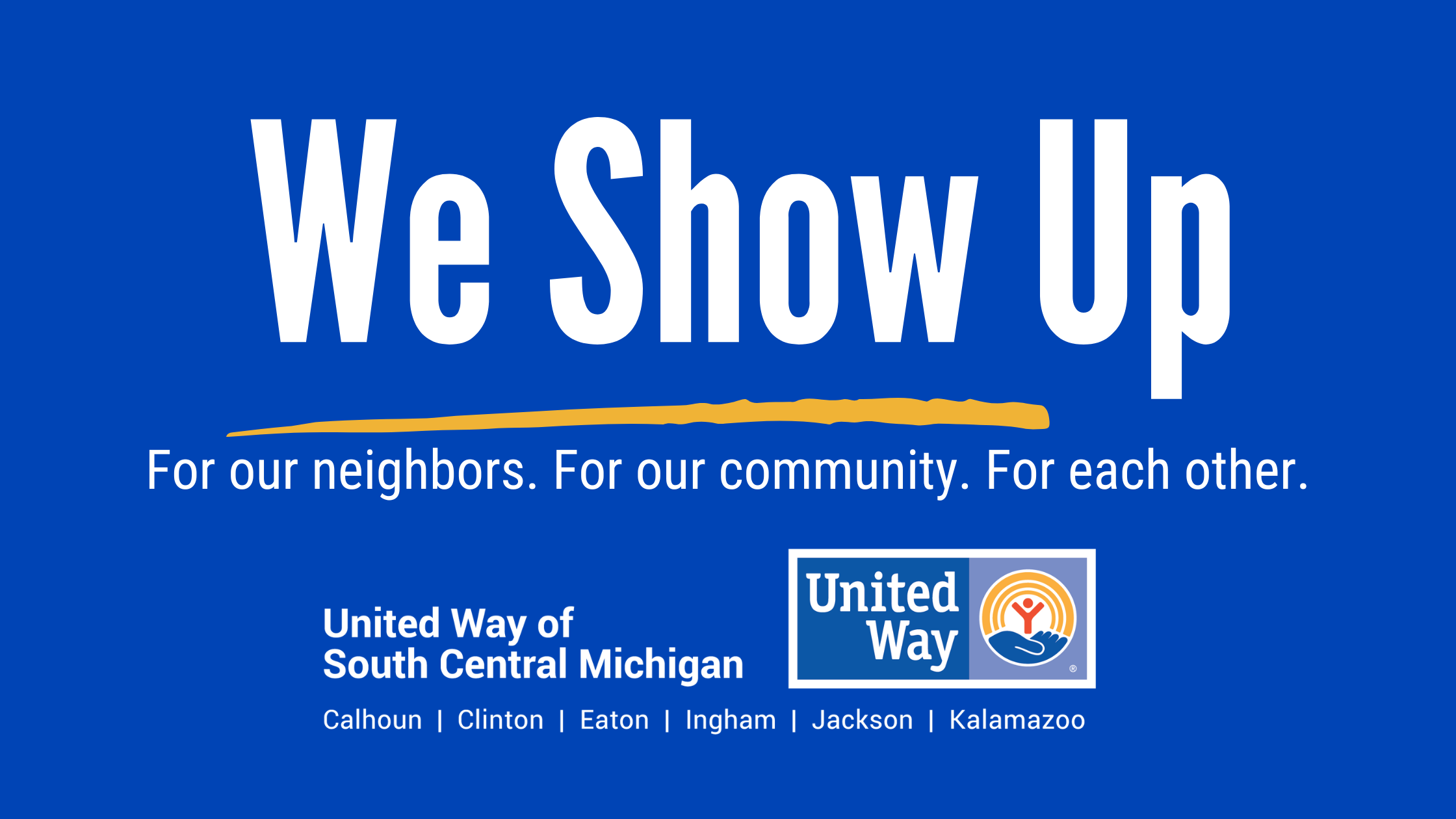
As United Way of South Central Michigan (UWSCMI) kicks off its annual fundraising campaign, it’s not doing so alone. Local partner organizations are adding their voices to UWSCMI’s “We Show Up” campaign, highlighting how the relationship benefits their work and the community as a whole.
“What does it take to tackle the toughest issues in our community? The answer is, all of us showing up,” said Chris Sargent, UWSCMI President and Executive Officer.
“Our local partners bring experienced innovators that we’re proud to work alongside,” he added. “United Way connects those partners to get at the root causes of issues like poverty, hunger, homelessness, disaster relief and inequity. We also gather resources near and far to accelerate this work.”
Many Partners, A Shared Commitment
UWSCMI works with 94 local agencies on 124 programs across its six-county region. Jen Hsu-Bishop, Executive Impact and Equity Officer, said this network of partners brings critical expertise directly to local communities. At the same time, they are united in their commitment to addressing needs.
“United Way envisions strong, caring communities where every person is valued, thriving and connected for the common good,” Hsu-Bishop said. “Our partners bring their unique skills to specific needs in specific ways, yet we all share this commitment—making sure families can withstand a financial setback, kids go to school fed and ready to learn, workers have reliable and affordable childcare, people have safe housing, and much more.”
Hsu-Bishop pointed to programs and partnerships focused on financial hardship—ALICE (Asset Limited, Income Constrained, Employed) households that struggle to make ends meet—where there is great potential to transform lives. Data show 41% of working households in the region live below an income level considered financially stable.
“Communities depend on the financial stability of every citizen,” Hsu-Bishop explained. “Yet ALICE families, many of whom face racial and economic disparities every day, deal with financial hardships that force them to make impossible choices. Rent or utilities? Food or medicine?
“The issues are complex. Solutions depend on many experts coming to the table. United Way is uniquely equipped to make those partnerships happen,” they added.
Local Examples of Partnership
In greater Battle Creek, UWSCMI serves as the lead agency for the Calhoun County Continuum of Care, a partnership of 12 local organizations addressing homelessness across the county. United Way took on that role earlier this year, and together the group has been strengthening local connections.
“We partner with our members to increase coordination and find solutions to the gaps, inequities, and challenges faced by people who experience houselessness,” said Patrese Griffin, Calhoun County Continuum of Care Director.
In Jackson, partnership is key to the success of JobSTAR, a resource network helping local employees overcome obstacles that impede their ability to work. A JobSTAR Success Coach connects workers to services and support. The network currently includes 20 members, including 10 nonprofits. Between October 2023 and June 2024, JobSTAR managed 1,041 referrals and served 554 employees.
United Way partnership in Kalamazoo appears in many ways. One key effort is a collaboration with the City of Kalamazoo, the Foundation For Excellence and Kalamazoo County to provide grants to local microbusinesses—operations with no more than 10 employees and revenue under $1 million. Known as the Kalamazoo Micro-Enterprise Grants (KMEG), these funds typically go to very small businesses owned by BIPOC (Black, Indigenous, People of Color) individuals, women, or located in Shared Prosperity neighborhoods. Launched in 2020, KMEG provided $2.75 million supporting 550 microbusinesses through 2023.
“We’ve partnered with United Way on vital small business support programs and more,” said Laura Lam, Chief Operating Officer for the City of Kalamazoo. “United Way is a trusted partner that works with us to make the Kalamazoo area a great place to live.”
In Lansing, partnership leads to bright futures for local students. The Capital Area College Access Network (CapCAN) is community collaboration led by UWSCMI aimed at making sure post-secondary education is something every student can reach, especially those who are low income, first-generation college students, or students of color. CapCAN serves Eaton and Ingham counties. Last year alone, CapCAN served 3,400 local students.
“It’s tough to navigate the steps toward college. That’s why we depend on United Way to provide financial and leadership support so we at CapCAN stay focused on getting kids through the process and on their way to success,” said Michele Strasz, Director of CapCAN.
Triple-Plus The Impact
UWSCMI’s Sargent said United Way brought in $3.28 for every $1 donated to the organization in 2023-24. The result was over $23.6 million going in local programs.
“United Way is a great investment of charitable dollars,” he said. “Our merger in 2022, along with continued support at the local level, makes it possible to tap new grants and other resources, meaning more dollars to support local impact and more local lives being changed. That’s what showing up is all about.”
More information about United Way of South Central Michigan, its local partners and programs, and focus areas is available at unitedforscmi.org. A link for secure online donations and other ways to support United Way can be found at unitedforscmi.org/ways-to-give.
